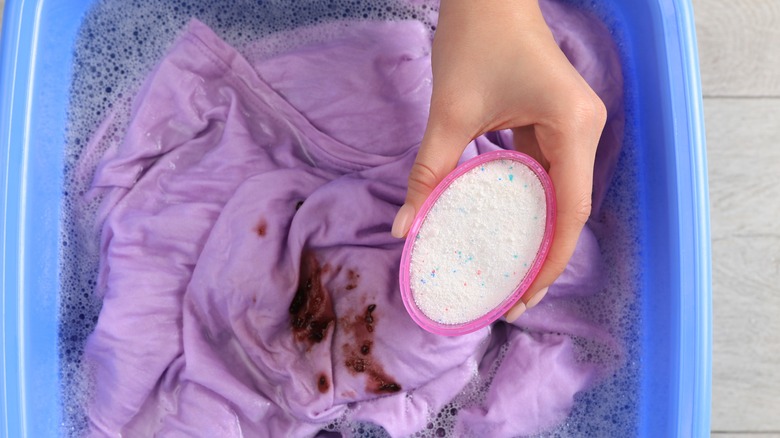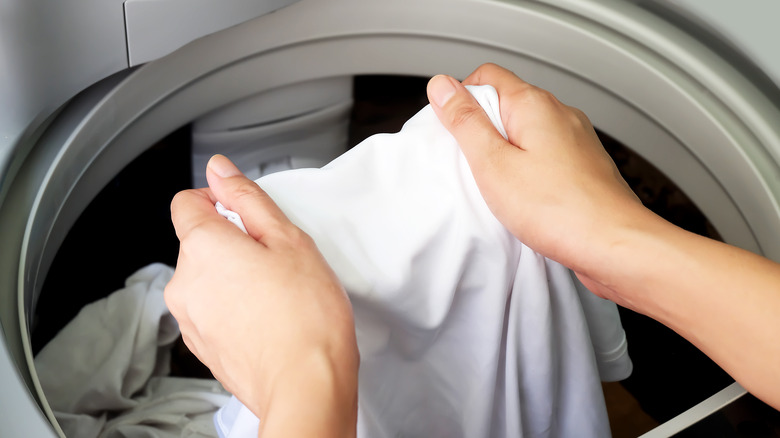Clothes Fading Fast? You May Be Using Too Much Laundry Detergent
When doing your laundry, you presumably have a lot on your mind. You're probably thinking of all the pressing things you need to do, scrolling through social media or chatting with your friends. The last thing on you might be pondering is the laundry itself. We totally understand. It's just a chore you do to keep your stuff clean without putting too much thought into it. But if you're not careful with your laundry, you might be causing more harm than good to your favorite clothes.
Everybody knows the basics of laundry. We all know that we should separate our white and colored clothes. We can figure out the recommended cycle time and type, as well as the water temperature by reading the labels on the clothing. But one of the major components of laundry we don't pay much attention to is the amount of detergent we really should be using.
Most of the time, we take one of two approaches to detergent. We eyeball the amount of detergent required based on the number of clothes we're washing, or we follow the instructions on the detergent packaging. Eventually, we fall into a rhythm and it becomes a part of muscle memory. We seem to think we're doing it right because the clothes don't look much different after the wash. But in reality, we might be going overboard, and by the time we realize it, it's too late to be fixed.
Telltale signs you're using too much laundry detergent
Ideally, when you take your freshly-washed clothes out of the washing machine, they should have a clean and crisp feel. But if you go overboard on the laundry detergent, they'll come out feeling slimy and have a sudsy residue. This happens because the amount of water in your machine cycle isn't proportionate to the laundry detergent, which causes the residue to remain instead of being cleaned off. Due to this, your clothes might also feel stiff instead of soft.
Additionally, the excessive detergent might lead to a funky scent wafting from your clothes and the machine itself. This can be attributed to the soap buildups inside your machine having attracted mold, mildew, or bacteria. Speaking to Consumer Reports, Melanie Carver, a spokesperson for the Asthma and Allergy Foundation of America said, "Mold that grows in washing machines can be problematic even when the machine is not in use." She added, "Mold can trigger allergic symptoms — including sneezing, itching, runny nose, and congestion — and can also be an irritant to the airways." Obviously, neither of these is good news, and if you've got a moldy washing machine then you need to clean your washer out using vinegar and baking soda.
Sometimes the detergent you're using might be too harsh for your clothes. Often, laundry detergents contain ingredients like bleach for effective cleaning, but these ingredients can cause your clothes to lose their vibrancy and turn lighter, and using them in excessive quantities only worsens their ill effects.
Here's how much laundry detergent you should be using
There are several factors that determine how much detergent you should be using. As Shawn Ashby, Whirlpool Laundry Brand Manager, explained to Insider, "The recommended dosage can depend on a variety of things like the detergent concentration level, load size, soil level, and water hardness." Though, as a general rule of thumb, you shouldn't go for any more than two tablespoons worth of laundry detergent for a larger load. Also, remember that laundry detergents are packed with effective ingredients, so you don't need to use excessive amounts to get the job done.
If your detergent is highly concentrated, you can get away with using half the recommended usage, so if your laundry load is in the average range of eight pounds, you don't need any more than one tablespoon. If you have a High Efficiency (HE) machine, you can use slightly less detergent than the recommended amount, because they're programmed to get the job done with lesser. If you have hard water in your home, you can adjust by adding a bit more, and for softer water, do the opposite.
The type of detergent you use can also play a part in your clothes fading. If you're washing darker clothes, find a bleach-free detergent or one that's specifically formulated to keep colors intact. Wash your vibrant clothes in cold water. And before you chuck your clothes in the washer, turn them inside out for a gentler wash.


